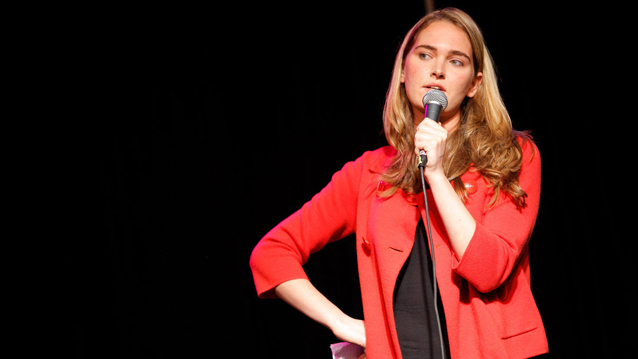Northwestern alumna Jena Friedman ended up “going native” -- in anthropological terms joining the group you are studying -- while writing her senior thesis on comedy.
Today the cultural anthropology major produces for “The Daily Show with Jon Stewart,” the iconic comedy show that broke the mold with the hilarious fake newscasts that millions turn to nightly.
Friedman was observing classes at Chicago’s legendary ImprovOlympic comedy club for her senior thesis on the role of gender, race and class in the world of comedy when she decided to go native.
“I wasn’t a theater major,” Friedman said. “That paper is what got me into comedy. I started doing improv and then a year or two later I started doing stand-up.”
After graduation, Friedman got serious about comedy. She moved to New York and eventually landed a coveted writing job for “The Late Show with David Letterman.”
For the last eight months, she has worked for “The Daily Show with Jon Stewart,” serving as a field producer for the show's zany assortment of fake news correspondents.
“It’s the first job that combines what I liked most about anthropology with comedy -- it’s funny and has a political point of view,” she said.
Friedman, a 2005 graduate of the Weinberg College of Arts and Sciences, attributes her unexpected career and success to Northwestern.
“It’s weird, but 100 percent of where I am now is because of that anthropology program at Northwestern,” she said.
Friedman recently discussed her Northwestern roots and how they led her to success in the comedy business.
How did you transition from majoring in anthropology to writing for “The Late Show” and producing for “The Daily Show?”
After graduation, I continued performing improvisation in Chicago. Chicago is a great city if you want to study comedy because the community is really supportive and there’s so much access to stage time there. Also, in Chicago, there’s very little industry so you can experiment and play, and if you’re terrible -- which most comics are at the start -- no one will see you fail. I started performing stand-up because I was working as a consultant at Booz Allen Hamilton and traveling all the time. Stand-up just felt more portable and travel-friendly than improv. Also, I got cut from my house team at ImprovOlympic for missing too many rehearsals.
After a few years in Chicago, I moved to New York. A play that I had written that was a parody of American Girl Dolls was featured in the New York Fringe Festival, and I felt like it was a good time to make the leap. After a year of performing stand-up in New York, I was connected to a manager who submitted me as a writer for “Late Show with David Letterman.” Eleven months after that, right as I was about to move to LA to attend UCLA film school, I was hired. I worked at Letterman for a year and when the field producer position at "The Daily Show" opened up, I applied for it and have been at the show for about eight months. It's not as easy as I'm making it sound. I broke some teeth along the way.
What was your “Late Show” experience like?
I had a great experience at Late Show. It was challenging writing for a show that has existed for 30 years. Sometimes I would pitch something and the writers would say, “That’s funny, but we did that in ’96.” But that’s also what made it such a great learning experience: working within the parameters of network TV, writing for a host who has such a specific sense of humor and trying to come up with new ideas for a show that has such an incredible history.
What are your duties for “The Daily Show?” How do you decide which stories to produce?
It’s a field producer role similar to any traditional news show with a field team that will go out and report on a story, but we just do it with “The Daily Show” point of view. We pitch all types of stories. Jon encourages us to pursue stories that we're passionate about and then after we come up with a take on the story, we'll meet with him to decide which stories to produce. The environment at “The Daily Show” is very collaborative and democratic. Jon is really involved in the day-to-day and people are excited to be there, and I think that's part of what accounts for the show's continued success.
How has your Northwestern education influenced your comedy career?
Working on my senior anthropology thesis is what led me to comedy. It seems like now there’s such an emphasis on majoring in business or engineering -- degrees that some might say are more “recession-proof.” But my liberal arts education was invaluable and the anthropology curriculum really pushed me to explore what I was passionate about, and what I learned from my professors is still relevant to what I do now as a comedian and field producer. Even as a stand-up, I sometimes feel like an ethnographer, observing people’s behaviors and then commenting on it.


